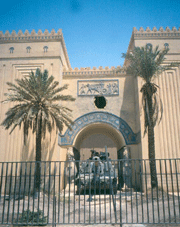 CULTURE
CULTUREEmergency Situations
To know nothing of the culture of others is to impoverish one’s own; to destroy the culture of others is an act of self-mutilation. Respect for cultural diversity and its corollary dialogue, is essential to the survival of humanity.
 |
||
| ©UNESCO / M. Bouchenaki | ||
In post-conflict and post-disaster situations, the recognition and implication of cultural diversity, as regards heritage and creativity, enhances the value of life and serves as a positive force behind dialogue, mutual understanding, reconciliation, social stability and reconstruction.
Reinfusing life into a heritage that has been targeted; transforming it into a rallying point and symbol of diverse identities; repairing the damage caused by disasters by emphasizing those aspects that bring peoples together: these are the ultimate goals of the numerous actions undertaken by UNESCO, such as conserving monuments and sites, protecting them from looting and the illicit trafficking of movable property and enabling traditional cultures to dialogue with other cultures.
Promoting good practices in the area of intercommunity mediation, developing intercultural sensitivity particularly among young people, encouraging the exchange of culture goods and expressions as well as encounters between cultural actors who serve as symbols of national history, revealing the multifaceted nature of history and the so-called national culture: such actions can contribute to the construction of a common future for communities that are tempted to seek refuge in their roots after having suffered at the hands of humankind or the forces of nature.
These are the axes of cooperation organized by UNESCO with its partners in the framework of projects undertaken by countries affected by conflicts or natural disasters like the earthquake in Haiti.
Its action for intercommunity reconciliation will be implemented in Iraq, Afghanistan, South-East Europe (Bosnia-Herzegovina, Kosovo) the Caucasus region, the Middle East, Cyprus, Cambodia, East Timor, North and South Korea and Africa.
News
Documents
The exhibition "Iraq: UNESCO post-conflict response" is organized by UNESCO Office of Baghdad in Amman in close cooperation with the Permanent Delegation of Iraq to UNESCO.
Afghanistan, Iraq, Lebanon, and Rwanda: after periods of conflict, reconstruction and reconciliation do not come so easily.
Information Kit
© 2008 - UNESCO